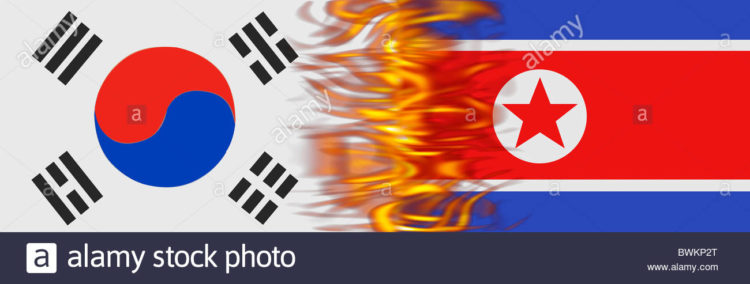Kim Jong Un Makes History With Short Walk Over Korean Border

published Apr 26, 2018, 7:31:41 PM, by Andy Sharp and Kanga Kong
(Bloomberg) —
Kim Jong Un on Friday became the first North Korean leader to enter South Korea since the peninsula was divided almost seven decades ago as talks begin over dismantling his nuclear weapons program.
At 9:30 a.m. local time, a smiling Kim was greeted by South Korean President Moon Jae-in at Panmunjom village before stepping across the border. They together stepped onto the northern side of the dividing line before returning to the south. The symbolism-laden meeting — the third between leaders of the nations since the Korean War and the first since 2007 — will go a long way in determining whether Kim can eventually strike a deal with U.S. President Donald Trump.
Here’s the Schedule for Korean Leaders’ Historic Summit Friday
The stakes couldn’t be higher. Kim’s regime is on the cusp of developing a missile capable of striking any U.S. city with one of his estimated 60 nuclear bombs. Trump has tightened economic sanctions against Kim’s regime and warned of military action if he continues to threaten the U.S.
“This summit is solely focused on denuclearization and policies to achieve lasting peace,” Im Jong-seok, Moon’s chief of staff and head of summit preparations, told reporters Thursday. “It’s difficult to predict” what any agreement would look like, he said.
Reports ahead of the summit said the leaders may sign a peace declaration to replace the 1953 armistice that has left the two countries still technically at war, as well as a phased withdrawal of troops and weapons from both sides of the demilitarized zone. They could also signal a mechanism for future talks on nuclear inspections and sanctions relief, two areas that have prompted previous negotiations to collapse.
Kim and Moon will have plenty of photo opportunities: Shaking hands, signing a guestbook, planting a tree. The leaders also plan to sign agreements before a banquet, and may even hold a joint press appearance.
“Kim Jong Un will open-heartedly discuss with Moon Jae In all the issues arising in improving inter-Korean relations and achieving peace, prosperity and reunification of the Korean peninsula,” the Pyongyang-based Korean Central News Agency said earlier Friday.
As a precursor to the summit, Kim promised last week to extend his freeze on missile and atomic tests, as well as dismantle a key nuclear facility.
Trump applauded the pledge to halt nuclear tests as “big progress,” going as far this week as calling Kim “very honorable.” That was a far cry from last year, when he nicknamed Kim “Rocket Man” and threatened to destroy the country.
Nuclear Weapons
Gary Samore, executive director for research of the Belfer Center for Science and International Affairs at Harvard University, said that North Korea’s direct nuclear threat to U.S. security makes atomic weapons the most important issue for Washington.
“They’re not sincere about giving up their nuclear weapons, but they may be sincere about accepting limits on their nuclear weapons in exchange for economic benefits,” Samore said Thursday on Bloomberg TV. “In the past, they’ve accepted temporary limits and constraints on the program in exchange for concrete benefits. All of those agreements eventually collapsed because the North Koreans cheated or reneged on the deal.”
Nuclear weapons have become central to the regime’s identity, with North Korea’s status as a “nuclear state” enshrined in its constitution. Giving them up is more than just a tactical choice: It would signal a fundamental change in how one of the world’s longest ruling dynasties maintains power.
Even so, any progress on dismantling the program would likely be slow and fraught, and involve visits by international inspectors. Prior efforts involving Kim’s late father when he was leader collapsed in acrimony, with North Korea blaming the U.S. for failure to adhere to the agreements.
For North Korea, economic assistance would be a key issue at the talks, said Ri Pyong Hwi, a professor at the Pyongyang-affiliated Korea University in Tokyo.
“Diplomacy, unification and the economy, which were quietly moving along in parallel with nuclear development, are becoming the top priorities,” Ri told reporters in Tokyo this week. “If the U.S. is going to call for the abandonment of nuclear weapons, they will need to conclude a peace treaty, and normalize relations between North Korea and the U.S.”
–With assistance from Isabel Reynolds.To contact the reporters on this story: Andy Sharp in Tokyo at asharp5@bloomberg.net ;Kanga Kong in Seoul at kkong50@bloomberg.net To contact the editors responsible for this story: Brendan Scott at bscott66@bloomberg.net Daniel Ten Kate
COPYRIGHT © 2018 Bloomberg L.P



No Comment